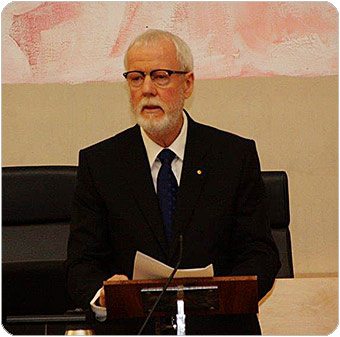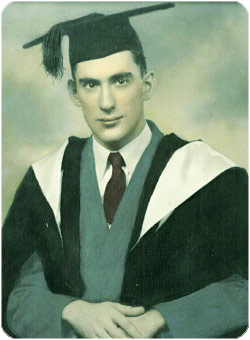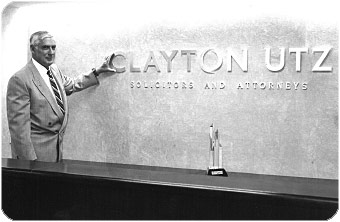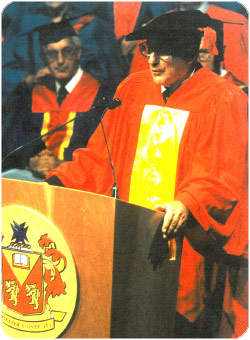Issue 73: July 2015, Speeches and Legal Articles of Interest
Justice John H Byrne AO RFD [1]
In about a fortnight, on the 3rd of June, a decade will have passed since Alex Freeleagus departed this life.
It is a testament to the high esteem, and great affection, in which he was held — by his family, his huge circle of friends, his colleagues in the law and in other endeavours — that so many of us are here to absorb the oration in Alex’s honour soon to be delivered by another outstanding lawyer of Hellenic heritage.
Among us are Alex’s sister, Mrs Rene Nicolaides OAM, his great-niece, Alice-Ann Psaltis, and his great-nephews, Jonathan Psaltis and James Nicolaides.
 Alex’s father, Christy Freeleagus, hailed from the island of Kythera. He migrated near the start of the 20th century, arriving a few months before Federation.
Alex’s father, Christy Freeleagus, hailed from the island of Kythera. He migrated near the start of the 20th century, arriving a few months before Federation.
Alex’s mother, Ariadne Kokkonis, reached Australia in 1924, as a refugee from war-ravaged Smyrna. On the coast of Anatolia, Smyrna had been inhabited by Greeks for at least three millennia.
After completing his secondary schooling at Church of England Grammar School, Alex enrolled in Arts/Law at the University of Queensland.
At University, Alex indulged what would become an abiding interest — military service.
The post-war manifestation of the army on campus was Queensland University Regiment.
In 1948, Alex was in the first intake of that new unit: those originals included Alex’s close friend, Sam Harrison (who is here tonight).
 After a while, Alex switched services, transferring to the RAAF. Initially, he joined the University Squadron. There he was commissioned.
After a while, Alex switched services, transferring to the RAAF. Initially, he joined the University Squadron. There he was commissioned.
After graduating from law school, Alex transferred to the City of Brisbane Squadron, as the intelligence officer. Eventually, he moved to the RAAF legal reserve branch.
Alex saw active service — briefly – in Vietnam, composing wills for service personnel.
Alex learned more of value about practising law from service life than he had imbibed at law school. Through the Army and Air Force, he met, he said, real people, and encountered their real problems. He learned much about himself too.
After fifteen years as an officer, Alex was awarded the Reserve Force Decoration.
His exemplary defence force service was recognised when, in 1977, with the rank of Wing Commander, he became a Member of the Military Division of the Order of Australia.
Alex remained in the Air Force until 1988. His military service spanned 40 years.
Over those years, he learned to fly. And flying was a recreation he shared.
I can remember the day I went flying with Alex in his light aircraft.
Alex seemed to me a capable pilot. Certainly, he was experienced.
But I was, I confess, a bit apprehensive. Our safe return to earth did bring to mind an episode of the Flintstones.
Barney Rubble and Fred Flintstone were talking about heading skywards in a basket attached to a hot air balloon.
Fred was not enthusiastic about the adventure. He told Barney: “I prefer terra firma. The more firmer, the less terror.”
Flying with Alex, I understood the sentiment.
Alex began articles of clerkship in 1950.
He was admitted as a solicitor in 1953.
By April 1954, he was employed by Henderson & Lahey. Within nine months, he had been made partner.
Air force reserve service led Alex to an interest in aviation law, which became a specialty of his in days when few Australian lawyers had such expertise.
His other professional specialties included real estate development and oil and gas exploration.
Henderson & Lahey amalgamated with Trout Bernays & Tingle in 1984, with Alex and George Deeb as senior partners of the new firm, Henderson Trout.

In 1992, Henderson Trout merged with Clayton Utz. The arrangement created a national firm with offices around Australia.
Alex retired from Clayton Utz in 1993, after 39 years as a partner — more than 20 as Queensland’s senior partner.
He became a senior consultant to the firm, concentrating on energy law, and held that position at his death.
Alex was a man of vision, energy and inspiration, and a creative lawyer.
Let me give one example of his inclination to innovate.
Alex was on the periphery of litigation about the Sklavos estate.
The dispute concerned a charitable bequest to the Kytherian Association of Queensland.
In one form or another, [2] the contests had dragged on for almost 30 years.
Alex hit on a novel form of resolution: he was instrumental in bringing the Metropolitan of Kythera to Brisbane.
The cleric was to engage in a process that we would now style mediation, working closely with the contestants to put an end to their long running dispute.
If memory serves me, it took the Metropolitan a day or so to achieve a mutually satisfactory compromise that, finally, ended the dispute.
Alex was also responsible for my most unusual role as a barrister.
Alex had land at Coolangatta. His plans for the property brought him before a planning tribunal.
The tribunal did not allow lawyers to appear.
So I became what lawyers call a McKenzie friend: someone who sits next to the advocate and gives advice about how to conduct the case.
The distinguished architect, Robin Gibson, who had designed some of Brisbane’s most iconic structures, was Alex’s architect.
He was also Alex’s advocate in the tribunal.
Alex, a little anxiously, observed as Robin Gibson asked the questions, and put the arguments, that I whispered to Robin.
It was a strange experience: a bit like a puppet show.
But Robin revelled in the different role of advocate; and, happily, Alex was satisfied with the process and its outcome.
Alex was not only prominent in legal work. He was also a leader of the legal profession; for decades.
He was involved in a committee that founded the annual Queensland Law Society Symposium. The first such event took place in 1961. The activity became the largest annual symposium of its kind in Australia. George Deeb wrote that: “Alex’s expertise in organising and administering the events and the social programs was so valued that he held” his position for more than 20 years.
Alex served on the governing Council of the Queensland Law Society. That Society appointed him as one of its Senior Counsellors, charged with guiding and supporting other solicitors around the State.
Alex’s consular responsibilities were very important to him.
His father had been Consul for Greece since 1919.
Soon after Alex’s 21st birthday, still a law student, Alex was appointed Vice-Consul.
Six years later, on his father’s sudden death, Alex became Consul.
The role was challenging and time-consuming.
Alex enjoyed the opportunities the Consulate offered to support the Greek community and to help others to find their way.
 The citation for Alex’s admission, in 1999, to the degree of Doctor of Griffith University recited:
The citation for Alex’s admission, in 1999, to the degree of Doctor of Griffith University recited:
“Being deeply aware of his Hellenic heritage and of the migrant experience through his parents, his prime aim has been to help migrants and their children strike an appropriate balance between their inherited culture and that of full participation of citizens in the everyday life of Australia — something he believed right from his teenage days could productively and rewardingly be achieved.”
Alex served as Consul for 48 years, until his death.
He was Greece’s longest serving Consul anywhere, and twice Dean of the Consular Corps.
He was honoured by the Greek government with the Silver Cross Royal of the Order of George the First of Greece.
There were to be Australian awards too.
For service to the Greek community, by the mid-70s, Alex was a Commander of the Order of the British Empire.
Alex’s adult life was committed to service to others: through the law, the armed forces, consular duties and leadership in professional, commercial, government and community organisations.
Alex’s interests and commitments were diverse.
He served on boards of public companies and the National Fitness Council.
He played major roles in organisations – State and Federal – concerned with immigration, citizenship and multiculturalism, including the National Council of Population and Ethnic Affairs.
Alex was instrumental in founding Brisbane’s annual Greek festival, Paniyiri.
He chaired the Queensland branch of the Order of Australia Association and was later Vice-President of the national organisation.
He was Chief of Team Attachés for the 1982 Brisbane Commonwealth Games.
He strongly supported the Greek Pavilion at World Expo 88.
In the early 1990s, he was closely involved with the Brisbane Biennial International Festival of Music.
Griffith University granted Alex the degree of Doctor of the University in recognition of “his guidance and commitment to the establishment of the Griffith University School of Law”.
In 1995, Alex became an Officer of the Order of Australia: for distinguished service “to the community, particularly to the welfare of the Greek community in Queensland, and to the ex-service community”.
Thereby, he achieved a rare distinction: awards in both divisions of the order that confers Australia’s “highest recognition for outstanding achievement and service” [3] .
Alex’s life was full of achievements and, more importantly from his perspective, a multitude of sustaining personal relationships with family and good friends.
To reflect on Alex is to remember a highly talented, gregarious, thoroughly decent man, of unquestioned integrity, who delighted in engaging with people from all walks of life; and did so with an unusual combination of charm, verve, and evident concern for them.
The most prominent Queensland lawyers are invited to contribute to the Supreme Court Library’s oral history project. Alex participated in early 2005, recounting highlights of his life to an old school friend and former judge, Tom Shepherdson.
Speaking of his early years, Alex said that his mother had ground into him:
“You do what you’ve got to do; and you do it with everything you’ve got”.
Alex did that.
And we are the better for it.
Bibliography:
1. Clayton Utz, Brisbane — Firm Foundations; Chapter 5.
2. George Deeb, “Alexander Christy Freeleagus”, In Memorium, Proctor, August 2005, p.41.
3. Citation for Admission to the Degree of Doctor of the University, Griffith University, 15 April 1999.
Footnotes
[1] Senior Judge Administrator, Supreme Court of Queensland.
Remarks at the Alexander Christy Freeleagus Oration, Banco Court, Supreme Court of Queensland, 22 May 2015.
[2] In the High Court of Australia see Kytherian Association of Queensland v Sklavos (1958) 101 CLR 56.
[3] Australian Government “It’s An Honour” (last updated 22 May 2014) https://www.itsanhonour.gov.au/honours/awards/medals/order_of_australia.cfm
accessed 22 May 2015.



 Alex’s father, Christy Freeleagus, hailed from the island of Kythera. He migrated near the start of the 20th century, arriving a few months before Federation.
Alex’s father, Christy Freeleagus, hailed from the island of Kythera. He migrated near the start of the 20th century, arriving a few months before Federation. After a while, Alex switched services, transferring to the RAAF. Initially, he joined the University Squadron. There he was commissioned.
After a while, Alex switched services, transferring to the RAAF. Initially, he joined the University Squadron. There he was commissioned.
 The citation for Alex’s admission, in 1999, to the degree of Doctor of Griffith University recited:
The citation for Alex’s admission, in 1999, to the degree of Doctor of Griffith University recited: